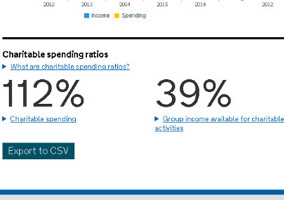The Charity Finance Group has said it is opposed to a range of proposals in the recent Charities SORP consultation, including more detailed disclosure of administration and fundraising costs and the inclusion of a “key facts summary”.
The Charities SORP sets the framework for charities' annual reports and accounts. A consultation on the latest draft closed to responses on Sunday, with a view to a new framework being launched in 2019.
In its response to the consultation, CFG said that charities should not be required to disclose fundraising and administration costs because comparing them “is not effective for the broad church that is the charity sector”.
It said that it is “impossible for readers to know what reasonable or unreasonable administrative and fundraising costs are as each charity operates differently”.
CFG also conducted a survey to inform its response to the consultation, which received 122 responses. It found that 88 per cent supported CFG’s view on these disclosures.
‘Little or no support’
CFG’s response states: “We have encountered no arguments made so far that more detail would be useful, and little or no support in the charity sector or amongst professional auditors.
“We believe that discussions around charity’s approach to efficiency and fundraising are best done through charities using narrative reporting, where context and explanations can be given and numbers presented in a useful manner.
“CFG strongly believes that additional disclosure of the kind referenced in the research consultation would ultimately undermine public trust and understanding rather than increase it.”
Furthermore, CFG said that the current definition of “support costs” should be abolished entirely.
“Removal of support costs would actually give a clearer picture of the true operations of charities.
“Ultimately, ‘support’ is critical to the delivery of charitable activities and should be considered a part of those costs.”
Key facts summary
CFG also opposed the proposal for a “key facts summary” to be included as an annex to the report. It said: “A summary would be detrimental to public interest as there is no consensus on what facts would be useful to universally declare to the public.
“Arbitrarily selecting ‘facts’ would therefore give false assurance and comfort to the public, undermining public trust and confidence in the long term.”
Some 86 per cent of respondents to its survey said they agreed with its opposition to the proposal.
Other viewpoints
CFG’s consultation responses includes a range of other comments, including:
- The SORP is too long, which is to the detriment of readers and also to those who are tasked with putting their charities annual reports together;
- The SORP-making body should ask itself who the audience is for charities’ annual report and accounts;
- Reporting of executive pay by larger charities should not be extended;
- Further definition and guidance on reserves does not need to be provided;
- There should be clarification on how charities can report on their public benefit;
- Charities should not be made to explain how beneficiaries are involved in service design;
- Charities should not have to specifically disclose expenditure that falls outside the jurisdiction of their registration;
- Governance costs should not be disclosed as a separate item because the definition is not reflective of reality and adds unnecessary complications;
- Reporting on financial instruments and hedge accounting should be simplified;
- Investment gains should be moved back to their position “below the line” on the statement of recommended activities, rather than being classified as net income and expenditure.
Related articles













